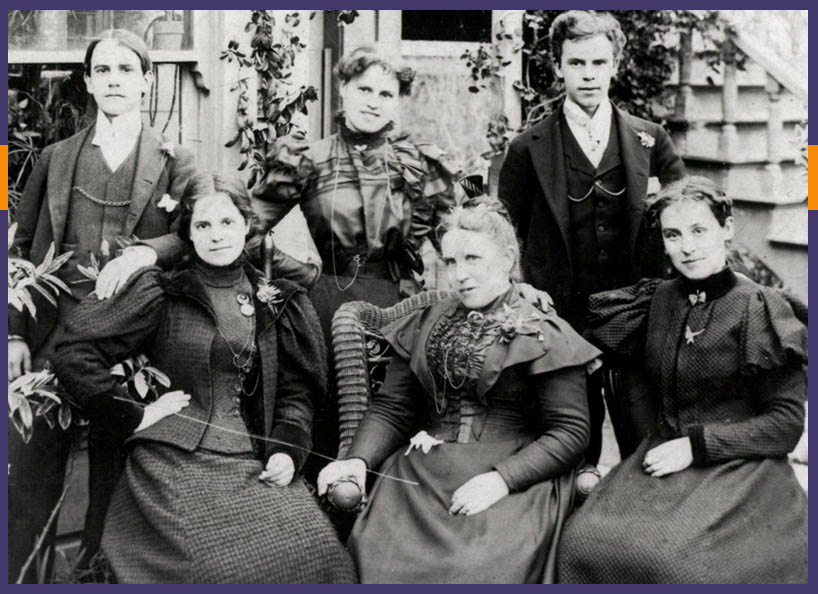“When it’s hard to have time for my present family, I find it hard to devote much to the past family.”
Who can relate to this idea that I heard at church?
Ohhh. Me! Me!
I can so relate. Time is the one thing I don’t have enough of. Except energy, that’s also lacking, and then I’m so exhausted from dealing with my present family that I don’t have time for anything else except binge watching Netflix.
But what if knowing about your past people actually helped you have a strong family, a happy family? What if focusing on the past allowed your to have more confident and resilient kids?
That’d be pretty great, right?
Well, I’ve got good news — it can. And it does. It’s pretty easy. And it’s SO powerful.
Why belonging is essential
Let’s chat first about belonging. Belonging is a basic, psychological human need.
Not want. Not nice to have. But NEED!

“Our interests, motivation, health and happiness are inextricably tied to the feeling that we belong to a greater community that may share common interests and aspirations,” Gregory Walton, a social psychologist at Stanford, told CNN a few years ago.
The sense of belonging helps us get through hard times. It’s the support of having someone say to you: “This is hard. I’ve been there, too. It’ll end and you’ll get through it.”
Family bonding is key to confident kids
The ultimate place of belonging is in a family.

In the early 2000s, a psychologist who studied children with learning disabilities noticed something interesting: “The [children who] know a lot about their families tend to do better when they face challenges.”
She shared this with her husband, Marshall Duke, who happened to be a psychologist at Emory University studying how family tradition and ritual effect the strength of a family.
Intrigued by his wife’s thought, he set out to test it. He developed a “Do you know?” survey and had dozens of families take it.
The results were staggering:
“The more children knew about their family’s history,” Dr. Duke found, “the stronger their sense of control over their lives, the higher their self-esteem and the more successfully they believed their families functioned.”

But when people don’t feel this strong sense of inclusion at home, they look elsewhere.
And, for that, I need to turn to My Little Pony.
What My Little Pony taught me about family
In 2013, my husband showed me a documentary that he probably regrets doing to this day. It’s called: Bronies: The Extremely Unexpected Adult Fans of My Little Pony.

This documentary follows young adult males who are major fans of the TV show My Little Pony: Friendship Is Magic. This fan group mainly contacted each other online and created fan fiction, songs, art, and new My Little Pony characters.
They even had their own fan convention: BronyCon.
The young men spotlighted were emotional about their attachment to the show and to each other. In both they found great life meaning.
In other words . . . they belonged.
Some of the highlighted Bronies seemed to feel at least somewhat outcast from other, more mainstream social groups. But they found acceptance, friendship, and similar interests with other Bronies.
They found identity within this group, this quasi-family, who felt and thought and acted similar to themselves.
Now, let me be clear here, that I’m in no way judging or ridiculing these young men. I, myself, am a My Little Pony fan. (That’s why my husband probably regrets showing me the documentary. I’d never heard of the show before.) I’m partial to Rarity.
Let’s make a group . . . and a story
This phenomenon can be observed in pretty much any walk of life.
For example, seeking and finding a sense of family, community, and belonging is one of the top 5 reasons people join gangs.
“To the majority of gang members,” the LAPD’s website reads, “the gang functions as an extension of the family and may provide companionship lacking in the gang member’s home environment.”
Or think about the loyal, tried-and-true fans of sports teams.
This is my personal observation, but it seems that die-hard fans remember their team’s “glory days” and believe that the team can get there again.
The blue-blooded fans of my alma mater Brigham Young University seem to be a good example of this. BYU football won the National Championship in 1984. These days, IMHO, they’re an average team.

But die-hard BYU fans still bandy the 35-year-old championship around. “We did it once,” they seem to say, “we can do it again.”
Sounds a lot like: “This is hard. I’ve been there, too. It’ll end and you’ll get through it.”
The fans share this passion, belief, and narrative with others who feel similarly. They create a group. They find identity and meaning and strength — at least on some level — by a sense of belonging and storytelling within this group.
Why your family story is the answer
So how can these ideas of passion and narrative and belief translate to the home.
It’s actually pretty easy, really.
Belonging at home can be as simple as telling your family’s story.
“The single most important thing you can do for your family may be the simplest of all: develop a strong family narrative,” said Duke, the psychologist from Emory University.
When Duke gave children the “Do you know?” survey, he asked them questions like:
- Do you know how your parents met?
- Do you know where your grandparents went to high school?
- Do you know about anything terrible that’s happened in your family?
- Do you know the story of your birth?

In other words — did these children know their family’s story?
The ones who did were emotionally stronger, more resilient, more successful in overcoming challenges.
In fact, your family’s story “gives you a sense of belonging and creates a core identity that can be a great source of empowerment,” explained Bonnie Oscarson, a leader in The Church of Jesus Christ of Latter-day Saints.
What the heck’s a “family story”?!?!
So, you may be asking, what’s a family story?
Well, it’s the story of your family — across several generations. (From you to your parents to their parents to their parents, and so forth.)
It can be upward in momentum — “Your grandfather came to this country with nothing, and today we’ve got the most successful store in the county.”

It can be downward in momentum — “We used to have it all, and then we lost it.”
But . . .
“The most healthful narrative,” Dr. Duke says, “is . . . the oscillating family narrative: ‘Dear, let me tell you, we’ve had ups and downs in our family. We built a family business. Your grandfather was a pillar of the community. Your mother was on the board of the hospital. But we also had setbacks. You had an uncle who was once arrested. We had a house burn down. Your father lost a job. But no matter what happened, we always stuck together as a family.’”
Sounds kinda like: “This is hard. I’ve been there too. It’ll end and you’ll get through it.”
“When faced with a challenge,” continues Dr. Duke, “happy families, like happy people, just add a new chapter to their life story that shows them overcoming the hardship.”
Family stories create strong families
Why does knowing your family’s story help you? Or strengthen family relationships?
It’s a question I’ve asked myself many, many times. Trying to find or define the why behind this phenomenon seems impossible.
Partly, it has to do with our psychological need to belong.
William R. Walker, another Latter-day Saint leader, offered this spiritual perspective: “The more connected we feel to our righteous forefathers, the more likely we are to make wise and righteous choices.”

Knowing the stories of our people roots us. Gives us depth and foundation. Helps us know we’re part of something more than just the present. We’re one link in a chain of history behind us and the future ahead of us.
“Without this enriching knowledge, there is a hollow yearning,” explained Roots author Alex Haley. “No matter what our attainments in life, there is still a vacuum, an emptiness, and the most disquieting loneliness.”
How to create your family story
Let’s get practical.
All this theory is great, but until you can incorporate it in your family, it won’t do you much good.
So here are a few ideas. Alter them and change them to fit your circumstance, they’re meant to inspire (not to dictate).
1. Learn your family stories.
- Talk to your parents and grandparents about their lives.
- Pay attention when people start sharing family stories — then record/remember them.
- Look for family stories on FamilySearch or Ancestry.
- Research your family tree to learn stories.
2. Share your family’s stories with your children.
- Do it informally during mealtimes, family nights, or scripture study.
- Try to share personal experiences with your children, when appropriate, that fit with what they’re currently going through.
- Encourage grandparents or other family members to share stories during large family get togethers – like, say, Thanksgiving or Christmas dinners.
- Be deliberate in helping your children develop a relationship with their grandparents (if circumstances permit).
What’s your take on this? Why do family stories help strengthen families and a child’s sense of self-worth? Let me know in the comments below!
Read Next
Sources
- Amanda Enayati, “The Importance of Belonging,” CNN, 1 June 2012, found online at https://www.cnn.com/2012/06/01/health/enayati-importance-of-belonging/index.html, accessed 25 October 2019.
- Bruce Feiler, “The Stories that Bind Us,” This Life section of The New York Times, 15 March 2013, found online at https://www.nytimes.com/2013/03/17/fashion/the-family-stories-that-bind-us-this-life.html, accessed 25 October 2019.
- Quoting Bonnie L. Oscarson in Marianne Holman Prescott, “Roots Tech 2015: Gathering, Healing, and Sealing Families,” Church News of The Church of Jesus Christ of Latter-day Saints, 14 February 2015, found online at https://www.churchofjesuschrist.org/church/news/rootstech-2015-gathering-healing-and-sealing-families?lang=eng&_r=1, accessed 25 October 2019.
- “Why Young People Join Gangs,” Los Angeles Police Department, found online at http://www.lapdonline.org/la_gangs/content_basic_view/23473, accessed 25 October 2019.
- William R. Walker, “Live True to the Faith,” April 2014 General Conference of The Church of Jesus Christ of Latter-day Saints, found online at https://www.churchofjesuschrist.org/study/general-conference/2014/04/live-true-to-the-faith?lang=eng, accessed 25 October 2019.




